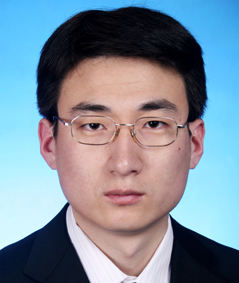IntroductionYouqing Wang received the B.S. degree in Mathematics from Shandong University, Jinan, Shandong, China, in 2003, and Ph.D. degree in Control Science and Engineering from Tsinghua University, Beijing, China, in 2008. He worked chronologically at Hong Kong University of Science and Technology, Hong Kong, China; University of California, Santa Barbara, CA, USA; University of Alberta, Edmonton, AB, Canada; Shandong University of Science and Technology, Qingdao, Shandong, China; City University of Hong Kong, Hong Kong, China. He is currently a Professor at Beijing University of Chemical Technology, Beijing, China. His research interests include fault diagnosis, fault-tolerant control, state monitoring, and iterative learning control for chemical and biomedical processes. Dr. Wang was a recipient of several honors and awards, including IET Fellow, NSFC Distinguished Young Scientists Fund, Journal of Process Control Survey Paper Prize, and ADCHEM2015 Young Author Prize. EducationWork ExperienceSocial PositionSocial ActivitiesResearchIn the field of fault diagnosis: Conducted systematic research on the fault estimation problem of two-dimensional dynamic systems, providing several necessary and sufficient conditions for the joint estimation of state and fault (asymptotical estimation, unbiased minimum variance estimation, H-infinity estimation). Designed various fault detection algorithms based on multivariate statistics, presented several sufficient conditions for fault detectability, and analyzed the computational complexity of the algorithms. In the field of fault-tolerant control: A robust fault-tolerant control strategy was first designed for a class of non-minimum phase nonlinear systems. Initiated internationally the research on fault-tolerant control for batch processes; some achievements have been practically applied in the injection molding processes, achieving notable results. In the field of artificial pancreas: Pioneered the application of iterative learning control to the closed-loop controller design for the artificial pancreas systems, introducing the concept of L-MPC, and conducted clinical trials. Proposed an automatic bolus and adaptive basal algorithm, realized full closed-loop control, and conducted clinical trials. TeachingTailoring my approach to the distinct needs of undergraduates and graduate students, I have introduced two relevant courses: “Modern Control Theory” and “Linear System Theory.” For undergraduates, I comprehensively expound upon fundamental knowledge, nurturing their academic interests and foundational capabilities. For graduate students, the focus is on cutting-edge theories and practical applications to foster their independent research and innovation capabilities.
PostgraduatesFunding001/2025-12/2029: Key Project of National Natural Science Foundation of China (Grant No. 62433004): Integrated analysis and monitoring of comprehensive safety in complex chemical processes Responsibility: Principal Investigator 01/2023-12/2027: Distinguished Youth Fund of National Natural Science Foundation of China (Grant No. 62225303): Safety assessment for intelligent chemical engineering systems Responsibility: Principal Investigator 01/2019-12/2021: Excellent Youth Fund of National Natural Science Foundation of China (Grant No. 61822308): Safety control of blood glucose dynamic processes Responsibility: Principal Investigator Vertical ProjectHorizontal ProjectPublicationsWang, Y.; Yin, M.; Wang, H.; Ye, X.; Ma, X.* (2024): Sample-evaluation-enhanced machine learning approach for fault diagnosis of hybrid systems. IEEE Transactions on Instrumentation and Measurement, 73: 3527313. DOI: 10.1109/TIM.2024.3442849 Shi, Y.; He, W.; Liang, L.; Wang, Y.* (2024): Distributed filter under homologous sensor attack and its application in GPS meaconing attack. IEEE Transactions on Automation Science and Engineering. DOI: 10.1109/TASE.2024.3418386 Sun, R.; Wang, Y.* (2024): Key-performance-indicator-related fault detection based on deep orthonormal subspace analysis. IEEE Transactions on Industrial Informatics, 20(5): 7249-7258. DOI: 10.1109/TII.2024.3353840 Cui, M.; Ma, X.; Wang, Y.*; Tuo, J.; Hou, T.; Zhao, J. (2024): Characteristic identification of flow control valves based on data-model-fusion in actual industrial scenarios. IEEE Transactions on Industrial Electronics, 71(10): 13157-13167. DOI: 10.1109/TIE.2023.3347858 Han, Y.; Li, Z.; Hu, X.; Wang, Y.*; Geng, Z.* (2024): Novel long short-term memory model based on the attention mechanism for the leakage detection of water supply processes. IEEE Transactions on Systems, Man, and Cybernetics: Systems, 54(5): 2786-2796. DOI: 10.1109/TSMC.2024.3350200 Wang, Z.; Wang, Y.*; Kowalczuk, Z. (2024): Adaptive optimal discrete-time output-feedback using internal model principle and adaptive dynamic programming. IEEE/CAA Journal of Automatica Sinica, 11(1): 131-140. DOI: 10.1109/JAS.2023.123759 Wang, Z.; Wang, Y.*; Davari, M.*; Blaabjerg, F. (2024): An effective PQ-decoupling control scheme using adaptive dynamic programming approach to reducing oscillations of virtual synchronous generators for grid connection with different impedance types. IEEE Transactions on Industrial Electronics, 71(4): 3763-3775. DOI 10.1109/TIE.2023.3279564 Liu, T.*; Hao, S.; Wang, Y.; Na, J. (2024): Predictive state observer-based set-point learning control for batch manufacturing processes with delay response. IEEE Transactions on Industrial Electronics, 71(1): 788-797. DOI 10.1109/TIE.2023.3245217 Awards
PatentHonor RewardAdmissions Information |

